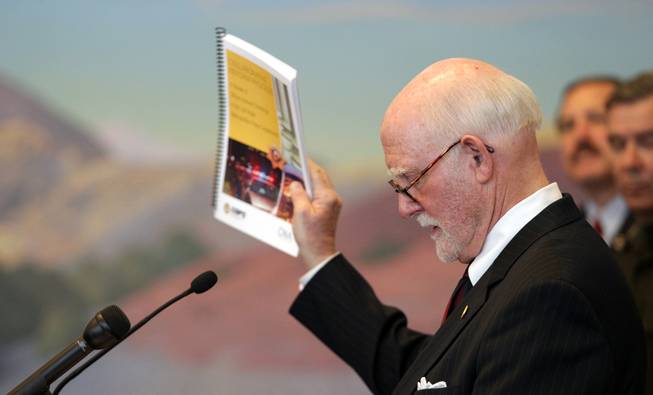
James “Chips” Stewart, a senior fellow of public safety at CNA Analysis & Solutions, holds up the report as he speaks during a press conference held by the U.S. Department of Justice Office of Community Oriented Policing Services at the Lloyd George Federal Building in Las Vegas on Thursday, November 15, 2012. The press conference was regarding an eight-month review of Las Vegas Metropolitan Police Department’s use of force policies and practices.
Published Thursday, Nov. 15, 2012 | 12:42 p.m.
Updated Thursday, Nov. 15, 2012 | 6:17 p.m.
Metro Police did not regularly analyze its use-of-force incidents, resulting in inadequacies in officer training and overall accountability, according to a 154-page report released Thursday morning by the Justice Department.
The report, eight months in the making by Justice’s Community Oriented Policing Services (COPS) Office, includes 35 findings and 40 subsequent recommendations, which Justice Department officials say will reduce officer-involved shootings — if Metro institutes those recommendations. Metro volunteered to undergo the review by the COPS Office on the heels of a Las Vegas Review-Journal investigative series into officer-involved shootings published in 2011. The Justice Department’s report findings were released in a news conference at the federal courthouse in Las Vegas.
Although Metro is under no legal requirement to accept the recommendations, the COPS Office will review Metro's progress in six months and again in one year. Officials, however, were vague about what measures would be used to review the department's progress.
"I am not afraid of this report, nor were (officers) afraid of this report," Sheriff Doug Gillespie told the assembled media, noting the true judgment of the department will come in the months that follow.
The COPS Office contracted with CNA Analysis and Solutions to conduct the review, which included interviews with nearly 100 community members and officers, direct observation of Metro operations and review of department data and records.
The following is a sampling of recommendations issued by the report:
• The report found Metro's new use-of-force policy was "comprehensive" but "cumbersome" and that it should be split into smaller segments, making it more easily understandable for officers in the field.
• Metro's Use of Force Review Board — currently a mix of residents and department personnel — needs revamping because of procedures the COPS Office found "outdated and insufficient." To remedy the situation, the report recommends Metro create a stand-alone manual for the board, which would outline its purpose, operating procedures and clarify roles of the board's members.
• The report found the department did not provide enough training about de-escalation tactics — in other words, methods to slow the momentum of ongoing police incidents. The review also illustrated a need for better management of situations involving multiple officers on scene. The report recommends an array of training improvements, such as more reality-based scenarios and mandatory de-escalation training.
• Because officer-initiated stops are more likely to result in shootings of unarmed suspects, the report recommends uniform training about the legal parameters of making such stops.
• The report suggests Metro should work with community leaders and others to create a process for releasing information after an officer-involved shooting. The department’s current practice is “not meeting community expectations and is contributing to the public’s negative perception” of Metro, according to the report.
Bernard Melekian, director of the COPS Office, said the challenges facing Metro “are not unique,” citing interest among other unnamed police agencies across the country to see the recommendations. Melekian also called the review process resulting in the report “nationally groundbreaking.”
“The potential here is great not only for Las Vegas and their efforts to improve services, but to the entire field of policing,” he said. “We have worked with Las Vegas to create a model, a resource for agencies to utilize when faced with critical incidents or challenges.”
The report, however, did not satisfy leaders of two entities — the American Civil Liberties Union of Nevada and the Las Vegas chapter of the National Association for the Advancement of Colored People — long pushing for reform within Metro.
In January, the ACLU of Nevada filed a petition on behalf of the NAACP Las Vegas with the Justice Department, demanding a civil rights investigation and independent monitor of the department.
A civil rights investigation has never come to fruition, nor did the report recommend an independent monitor of the department.
“There is nothing binding about these recommendations,” Melekian said. “These are suggestions. We have done so with the full support of the civil rights division, which always reserves the right to move forward in the event they feel there is some concern.”
Dane Claussen, executive director of the ACLU of Nevada, said he worried the lack of enforcement power behind the recommendations will hinder any progress.
“All the arrows would point to still needing a civil rights investigation and needing an independent monitor to be part of the landscape here,” he said. “I don’t have any confidence the (police) union will go along with these reforms.”
In addition, what was perceived as the COPS Office’s vague stance on two issues — the coroner’s inquest system and on-body cameras for police officers — irked the two organizations.
Although Gillespie has expressed interest in outfitting officers with wearable cameras, the report noted, “Wearable camera technology is relatively new, and further research is still needed regarding its efficacy.”
The COPS Office found the coroner’s inquest process ineffective and encouraged the Clark County Commission to review its necessity now that the District Attorney’s Office and Metro are releasing case reviews.
Last month, the Nevada Supreme Court ruled the revamped coroner’s inquest did not violate officers’ constitutional rights; however, the court determined the role of the justice of the peace, whom the Commission decided to have preside over the inquests, exceeded the duties outlined by the Nevada Legislature.
“We need immediate action,” said Richard Bouleware, first vice president of NAACP Las Vegas. “We need the inquest process to be updated and move forward. We need cameras on the officers and in the cars right away. We need an independent review process in place. The report addresses none of those, sadly.”
Melekian said Metro has begun addressing half of the recommendations outlined in the report. In that time, the number of officer-involved shootings has dropped.
There were 25 officer-involved shootings in 2010 and 17 in 2011, according to the report. Metro officers were involved in four shootings since Oct. 29, bringing the total number this year to 10.
Gillespie said he’s confident the community will see progress based on the changes already in place and more on the horizon.
“I do believe we’ve learned over the years that — via policy, via training, via reinforcing messages — you can further put forth to an organization exactly what, culturally, you want to do,” he said.
Even so, the report found that one change taken on in 2010 already had fallen prey to lack of manpower. In late 2010, Metro developed the Force Investigation Team (FIT), which dedicated a single squad to handle all officer-involved shooting cases. By April 2012, however, FIT model remained in “name only,” according to the report.
The finding raises questions about whether Metro will be able to adopt the 40 recommendations and then sustain them.
“I won’t say that the budget aspect will not be a part of some of this discussion,” Gillespie said, referring to the recommendations. “…But I don’t look at that as a reason that we can’t (move forward). I think this police department has been very resourceful in how the department has handled this downturn in the economy.”
Claussen said the ACLU of Nevada intended to continue its regular meetings with Gillespie, as well as advocate for a civil rights investigation.
“We’re not giving up on our petition for a civil rights investigation,” he said. “We have not withdrawn it or modified it, and we have no intent of doing so.”


Join the Discussion:
Check this out for a full explanation of our conversion to the LiveFyre commenting system and instructions on how to sign up for an account.
Full comments policy